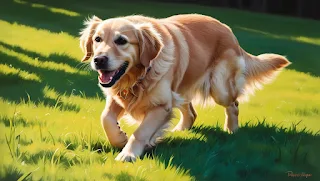If you've ever caught your dog munching on grass during a walk or in the backyard, you're not alone. Many dog owners wonder, "Why does my dog eat grass?"—is it normal, or is it a sign of a problem? The good news is that grass-eating is a common behavior in dogs, and in most cases, it's completely harmless. However, understanding why your pup does it can help ensure they stay healthy and happy.
In this article, we'll explore the possible reasons dogs eat grass, whether you should be concerned, and how to prevent excessive grass consumption.
1. Is It Instinctual?
Dogs are descendants of wild canines, such as wolves, which often consumed plant material found in their prey’s stomachs. Some experts believe that dogs may instinctively eat grass to supplement their diet with fiber or other nutrients they might be missing.
2. Dietary Deficiencies: Does Your Dog Need More Fiber?
Some dogs may eat grass because they lack fiber or other essential nutrients in their diet. If your dog frequently snacks on grass, consider evaluating their food. Adding fiber-rich options like sweet potatoes, pumpkin, or leafy greens can help balance their diet.
3. Does Grass Act as a Natural Remedy?
Many people believe dogs eat grass to induce vomiting when they feel unwell. However, studies suggest that less than 25% of dogs vomit after eating grass, so this may not always be the case. Still, if your dog suddenly starts eating a lot of grass and seems sick, it’s worth a vet visit.
4. Boredom and Behavioral Reasons
Dogs are naturally curious creatures. If they're left alone for too long or don't get enough exercise, they may eat grass out of boredom. Ensuring your dog gets plenty of mental and physical stimulation can help curb this behavior.
Related Articles for Pet Owners:
5. Is Your Dog Just Enjoying the Taste?
Some dogs simply like the taste of grass. If your pup tends to eat fresh, moist grass, it could be that they enjoy the texture and flavor. As long as it's not excessive and they’re not eating chemically treated grass, it's usually not a problem.
6. Could There Be a Health Issue?
While occasional grass-eating is normal, excessive consumption may indicate an underlying issue, such as:
- Gastrointestinal upset – Dogs with stomach discomfort might seek relief by eating grass.
- Parasites – Some intestinal parasites can cause changes in eating habits.
- Pica disorder – This condition causes dogs to eat non-food items, including grass.
If your dog is obsessively eating grass, consult a vet to rule out any health concerns.
7. How to Prevent Excessive Grass Eating
While it's normal for dogs to eat grass occasionally, here are some tips to minimize the behavior:
✔ Provide a balanced diet – Make sure your dog's food meets their nutritional needs.
✔ Increase exercise and playtime – Bored dogs are more likely to eat grass.
✔ Keep your yard chemical-free – Avoid pesticides and fertilizers that can be harmful.
✔ Offer safe alternatives – Give your dog chew toys, bones, or safe raw veggies like carrots.
Useful Resources for Dog Owners:
Final Thoughts: Should You Worry?
In most cases, occasional grass-eating is nothing to be concerned about. However, if your dog is eating grass excessively, vomiting frequently, or showing other unusual behaviors, it’s best to consult a vet.
By understanding your dog's habits and ensuring they have a well-rounded diet and plenty of enrichment, you can help keep them happy and healthy.
More Helpful Reads:
Want more pet care tips? Subscribe to our newsletter for expert advice on keeping your furry friend healthy and happy!

















0 Comments